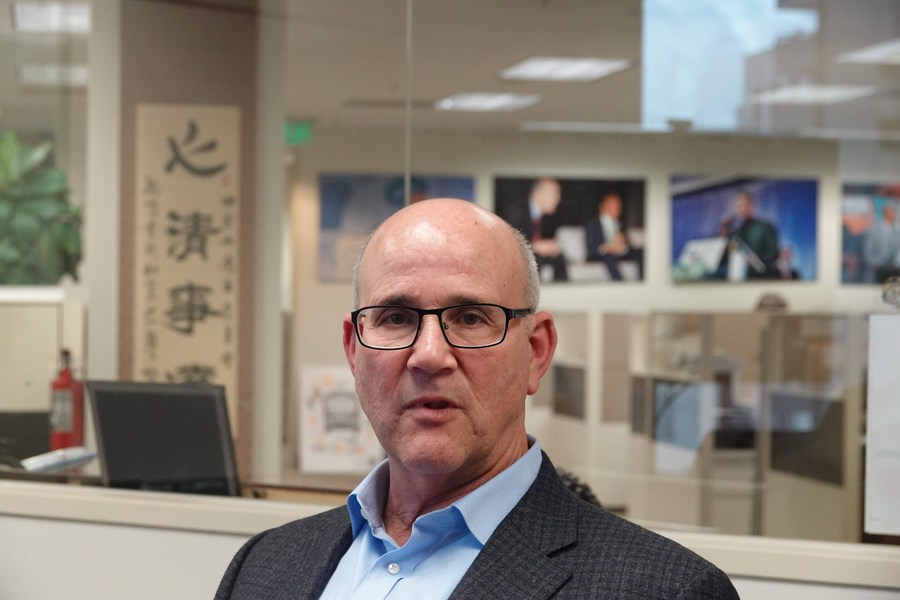
Jim Wunderman, president and CEO of the Bay Area Council (BAC), receives an interview with Xinhua in San Francisco, the United States, on March 27, 2019. (Xinhua/Wu Xiaoling)
Many forum attendees welcomed the robust trade relationship, noting it benefits both sides by stimulating economic activity, fostering market diversification, creating jobs and enabling knowledge transfers.
by Julia Pierrepont III, Gao Shan
LOS ANGELES, May 23 (Xinhua) -- The 2023 China-California Business Forum was held in downtown Los Angeles on Monday, drawing a crowd of over 400 business owners, entrepreneurs and officials from China and the U.S. state of California.
It's the first China-California Business Forum after the event was disrupted for three years by the COVID-19 pandemic. The forum had been held four times since 2016.
The forum is a signature event promoting California's trade and investment cooperation with Chinese provinces and focuses on various topics, including clean-tech, e-commerce, agriculture, infrastructure and innovation cooperation.
This year's event is co-hosted by the Chinese Consulate General in Los Angeles, the Bay Area Council, and the China Chamber of Commerce for Import and Export of Machinery and Electronic Products.
"The forum is designed to serve as a premier platform to step up communication, enhance mutual trust and tap more potential of business opportunities," said Chinese Consul General in Los Angeles Guo Shaochun in his speech, adding that there are broad prospects for cooperation between China and California in agricultural trade, cultural and entertainment industries, logistics and transportation, clean energy and elsewhere.
Jiangsu is the forum's guest of honor province this year. The province in the Yangtze River Delta in eastern China is one of the country's economic centers.
Fang Wei, vice governor of Jiangsu Province, noted in his speech that Jiangsu welcomes U.S. enterprises to increase investment in the province, home to over 85 million residents.
Noting that the friendship between the two sides has been fruitful, he hopes to use the forum to deepen exchanges and cooperation and strive to create more benchmark projects with California.
Jim Wunderman, president and CEO of the Bay Area Council, said that the forum has been "an important platform for business leaders to forge new partnerships across the Pacific and has served as a channel for state and provincial leaders to cooperate on trade, climate change, immigration and the many challenges that the pandemic present."
"Building trust in business relationships is crucial, particularly when there's a large ocean between us, and it is best achieved through personal connection," he said.
The business association, founded in 1945, is a public policy and advocacy organization whose members include more than 330 of the largest employers in the San Francisco Bay Area.
Brian Peck, chair of the Los Angeles Regional Export Council, said that the business forum had provided an important platform to expand trade and investment between California and China in the past and "will continue that role and also serve as an important bridge to reestablishing dialogue and helping to create new opportunities in California and the Chinese provinces to expand trade and investment."
Many forum attendees welcomed the robust trade relationship, noting it benefits both sides by stimulating economic activity, fostering market diversification, creating jobs and enabling knowledge transfers.
"I made some good contacts at the last forum in 2019 and hope to do the same this year," said small business owner Michael Landry, who is in the carbon reduction consulting sector.
"We're very pleased to see the resumption of visits to California by delegations from China," said Emily Desai, deputy director of International Affairs and Trade for the California Governor's Office of Business and Economic Development.
"We hope to be a positive force for good and believe that our strong people and strong commercial relationships can serve as a reminder of all we have to gain by working together toward peace and shared prosperity," she concluded.■
